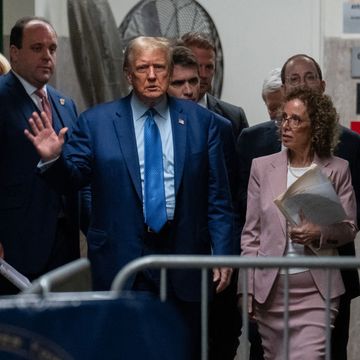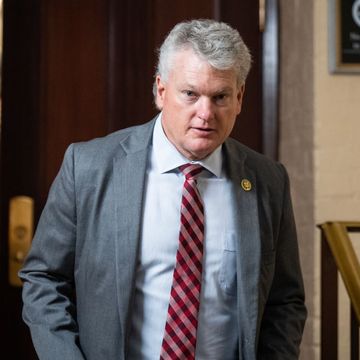I hope to live long enough to watch an important Republican make an argument that does not depend on poor-widdle-me performative victimhood, in which the Sad Unfortunate is beset on all sides by powerful legions of women, gay people, and poor people. I’m fully vaxxed now, so there’s hope on my end, but I’m not sure the Republicans can give up the rhetorical crack pipe anytime soon. Leaping to drive the nails into his own palms on Monday was Senate Minority Leader—that’s Senate Minority Leader—Mitch McConnell, who is wounded because major American corporations are picking on him, and on the state of Georgia.
“It’s jaw-dropping to see powerful American institutions not just permit themselves to be bullied, but join in the bullying themselves. Wealthy corporations have no problem operating in New York, for example, which has fewer days of early voting than Georgia, requires excuses for absentee ballots, and restricts electioneering via refreshments. There is no consistent or factual standard being applied here. It’s just a fake narrative gaining speed by its own momentum.
Lord, how do you get out of bed in the morning? Years ago, there was a mayor of Worcester, Massachusetts named John C. Mahoney, a kind of bargain-basement Jim Curley. A good Corkman by birth, John C. used to tell his campaign audiences that, “Me hands are tied, me back is to the wall, and the Protestants are after me.” This always was good for a few hundred votes in the wards of Main South. That, however, was first-class, stylish performative victimhood. Mitch McConnell should take lessons here.
(However, it was only good enough to get Mahoney elected once. The Protestants indeed were after him, and he lost his re-election to a Republican named Warren Cookson in 1935. Cookson keeled over and died at the 1936 Republican National Convention. He was the last Republican mayor Worcester has had.)
McConnell, of course, was chewing off his own leg because various corporations are following the lead of Major League Baseball and taking action against Georgia in response to that state’s new election regulations. It is clear that corporations actually acting in the public interest still wrong-foots Republicans and makes them fall all over themselves trying to respond. For example, Ted Cruz and Mike Lee both have muttered darkly about rescinding MLB’s antitrust exemption, something that liberal sportswriters (including this one) have been howling about at least since Curt Flood first went to court. And now McConnell is worried that Coca Cola might threaten to stuff Home Depot in a locker during free period.
It has been intriguing over the past few days to watch the elite political media pour us all a glass of warm milk and tell us that all the scary stuff about Georgia is just bustling in our hedgerows. Both the Washington Post and the New York Times hosted pieces telling us all to calm down a bit. (McConnell cited the Post specifically, if hyperbolically, in his Monday bleatings.) Nothing disturbs certain precincts of the elite political class more than power centers reacting to pressures from outside the system. This is partly because those episodes generally explode the myths and elements of denial to which too many people in our politics have become accustomed.
The simple fact is that the Republican Party has been a party of voter-suppression since at least the early 1960s. The last two chief justices of the United States Supreme Court have been Republicans and both of them made their partisan bones attacking voting rights in one way or the other. For years, its efforts were not the national party’s highest priority. But ever since the country elected Barack Obama twice, and the Republican Party saw a new majority rising to which it could not (and would not) appeal, the Republicans have made voter-suppression the cornerstone of their political strategy. (Chief Justice John Roberts, of course, did his part for the cause by declaring the Day of Jubilee and gutting the Voting Rights Act.) According to numbers compiled by the Brennan Center, legislators in 47 states have introduced 360 bills aimed at restricting voting, and this after an election that has been adjudged by every independent expert as one of the most secure in the history of the country.
This may scare the horses in the street, but this is also the self-evident truth: one of our two major political parties is dedicated to the proposition that not all citizens are equal under the law and, therefore, that some citizens deserve to have little or no say in how those laws are made. Every quibbling little fact-check of the current debate melts away under that hot, immutable fact. The Republicans lost elections they thought they were entitled to win, and now they are using every element of their power to make sure that doesn’t happen again. In the 1990s, confronted by the surprise loss of the White House, they used their power in Congress to pursue and harass a Democratic president. In 2008, after their bungling of almost everything caused them to lose the White House again, they used their power in Congress to sabotage another Democratic president while electing, in 2010 and 2014, the worst Congresses in the history of the Republic.
All voter-suppression is based on the feeling of entitlement to rule, and the Republicans are addicted to that more than they are addicted to anything else. But now, some of their erstwhile allies in the country’s power elites are getting nervous about how far the party has gone, and the Republicans don’t have the faintest idea how to deal with that. So into the palm goes another nail, and the threadbare passion play rolls on.

Charles P Pierce is the author of four books, most recently Idiot America, and has been a working journalist since 1976. He lives near Boston and has three children.














